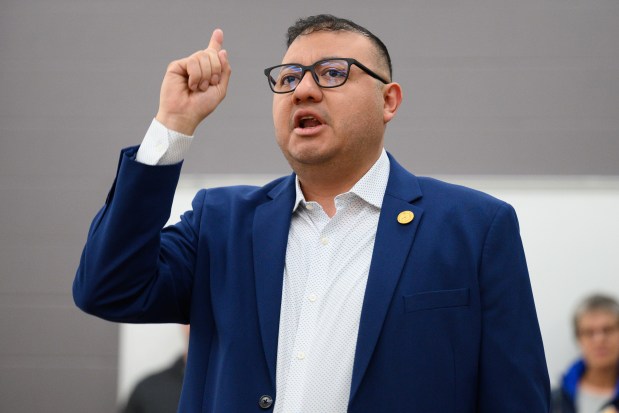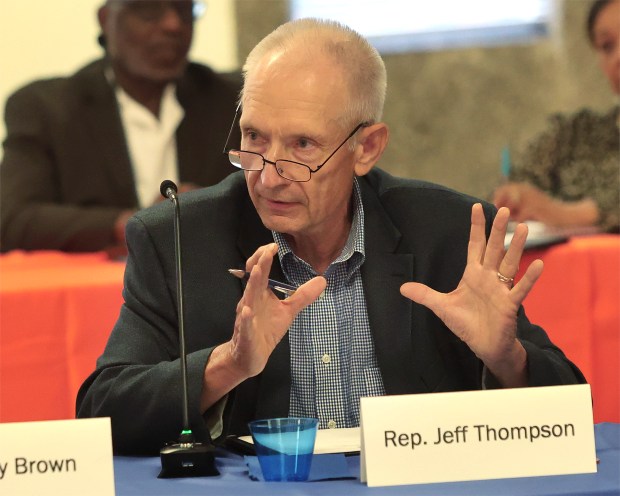Increasing “sin taxes” loomed over the Indiana budget as it was discussed in conference committee Monday, but one of the budget architects reiterated the increase was “on the table” along with increasing other revenue streams.
House Bill 1001, the biennium state budget, was discussed Monday because it was amended in the Senate. But the meeting was held a handful of days after the State Budget Committee received a revenue forecast, which projected a more than $2 billion shortfall for the next budget cycle.
Sen. Fady Qaddoura, D-Indianapolis, asked the conference committee chairman and budget architect Jeffery Thompson if Republican leaders have decided to increase the sin taxes – cigarette, alcohol and gaming taxes – as well as delaying reductions to income taxes, management care assessment fees and school vouchers.
“Everything is on the table right now. All topics have to be discussed at this point, and we’ll kind of see how it shakes out in the next 48 hours,” Thompson said.
Raising cigarette taxes by $2 a pack would result in an additional $800 million over the 2-year budget, Qaddoura said. Increasing alcohol and gaming taxes would raise $250 million over the biennium, he said.
Delaying reductions to income taxes to 2027 would yield $300 million, Qaddoura said. Adjusting the management care assessment fee could result in about $1 billion in savings for the state budget, he said.
“The total for these ideas, over the next biennium, is north of $3 billion. None of these ideas raise taxes on property taxes, income taxes or sales taxes,” Qaddoura said.
As Republican leaders touted “progress made” over the weekend on the budget, Qaddoura said it was done “behind closed doors.”
“The public deserves full transparency in these decisions because there’s nothing secretive about it. $2.4 billion are needed. The solutions are in front of our own eyes, and the bill is going to come before us for a vote. I don’t understand why this top secret negotiation is happening behind closed doors,” Qaddoura said.
Rep. Ed DeLaney, D-Indianapolis, said the state has “under taxed” the sin taxes.
“We don’t seem to want to tax sin the way we used to and the way we know how,” DeLaney said. “We could do better on that and help our people.”
Rep. Mike Andrade, D-Munster, said in addition to increasing the cigarette tax, he’d like to see the state consider a fireworks tax. In Lake County, firework sales skyrocket, especially around the Fourth of July, Andrade said.
With Senate Bill 1, the property tax relief bill, now signed into law, Lake County could benefit from an additional revenue stream, Andrade said. For example, as it’s likely fire departments will see a negative impact to revenues from Senate Bill 1, Andrade said the firework tax could fund fire departments.
“If you’re buying fireworks and you’re out there just blowing them off, you’re just blowing off money. Why don’t we tax it? It’s not a luxury,” Andrade said.
As the committee met the day after 4/20, Andrade said the legislature should consider legalizing marijuana, in some form, to create an additional taxing stream. Michigan, Illinois, Kentucky and Ohio have all legalized marijuana for medical and/or recreational use.

“I think we need to have those conversations as well, that we’re losing those revenue dollars to our neighbors around our state,” Andrade said.
After the legislators addressed the budget, eight people testified before the committee with suggestions or requests for future funding.
Joel Hand, with the Indiana Coalition for Public Education and the American Federation for Teachers Indiana, said the state could save over $81 million in the biennium by capping the school voucher program at its current levels.
“This is an expansion of school vouchers to make it universal that we simply cannot afford, and we ask that you put a cap on that choice program effective today for the 2-year biennium,” Hand said.
Tiffany Nichols, advocacy director of the Lung Association in Indiana, said the legislature should increase the cigarette tax by $2 a pack and to establish taxing parity among all tobacco products.
Indiana’s cigarette tax hasn’t been increased since 2007, Nichols said, and it remains the lowest in the country at 99 and a half cents per pack. Research has shown that increasing tobacco prices “is one of the most effective ways to reduce use.”
A 10% price increase typically reduces cigarette consumption by 4% among adults and 7% among youth, Nichols said.
“A $2 cigarette tax increase would not only prevent thousands of Hoosiers from dying of tobacco related deaths, but also generate nearly $371 million in annual revenue that could support tobacco prevention, Medicaid and other budget shortfalls,” Nichols said.
After discussion, the committee went into recess. The members did not reconvene for further discussion or a vote by presstime.
akukulka@post-trib.com




